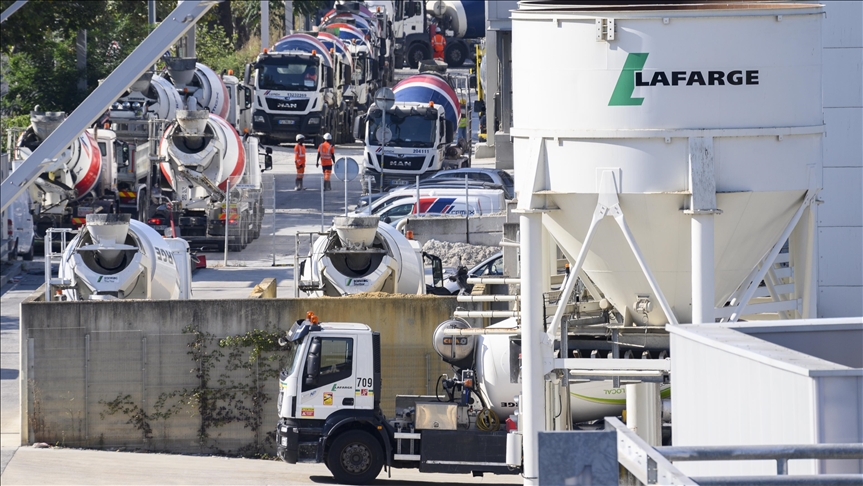
PARIS
After France’s top court ruled that cement giant Lafarge should face investigation on charges of complicity in crimes against humanity for financing the terrorist group Daesh/ISIS, representatives of civil groups involved with the case spoke to Anadolu Agency.
The civil parties in the Lafarge case – the European Center for Constitutional and Human Rights (ECCHR) and Paris-based Sherpa – spoke to Anadolu Agency about Tuesday’s Court of Cassation ruling.
Lawyer Cannelle Lavite of the center said the ruling is a symbolic decision that could, for the first time, allow a multinational company to be “charged with complicity in crimes against humanity” and gives a strong signal to companies operating in, or profiting from armed conflict zones.
Lafarge has operated a cement factory in northern Syria during the country’s civil war.
The Court of Cassation, said Lavite, signaled to companies that the excuse that they are “just doing business” cannot absolve them of their criminal liability for the crimes of their partners.
Documents obtained by Anadolu Agency showing that French intelligence agencies were aware of the relationship between Lafarge and terror group Daesh/ISIS show that Western actors have not only economic but also strategic and geopolitical interests in the region, she said.
Both Lafarge and France have to comply with international law, which includes respect for human rights, she added.
“If there are documents pointing to the responsibility of French state actors, we hope that the current investigation will take them into account and that the investigating judges will examine the possible criminal liability of the French state, like Lafarge,” she said.
Double standards for crimes in France
Asked about the responsibility of the European Investment Bank, one of the main investors of the cement giant in Syria, Lavite said that if Lafarge investors were aware of the crimes against humanity and that these crimes are facilitated by investments, accusations against the company can be brought against them.
According to Lavite, it is a “great paradox” that the Court of Cassation did not recognize Life for Paris, the group formed by the victims of terrorism, as a civilian party in the case.
“We have seen decisions in France that condemn mothers who pay for plane tickets to their children who go for a so-called 'jihad',” she said. “There is a very limited framework when it comes to giving victims of terrorist group financing access to justice. However, they are victims of terrorist attacks facilitated by this financing.”

After an appeals court accepted the company's request to drop "complicity in crimes against humanity" from these charges, the top French court overturned this decision.
Lepany said that although the top court announced that Sherpa could not be a civil party in the case, they would follow the case.
On the documents showing that Lafarge agreed with Daesh/ISIS on the knowledge of French intelligence units, she said: “We hope these elements will be included in the ongoing investigation and necessary measures will be taken.”
Noting that in the long run, an investigation could be opened into the ministers who were then in office, though not the state, she said that at this point, the Law Court of the Republic, where state officials are tried, will step in.
On Tuesday, France’s top court said cement giant Lafarge should face investigation on charges of complicity in crimes against humanity for financing the terrorist group Daesh/ISIS in northern Syria.
The Court of Cassation also upheld charges that the cement giant financed terrorism.
Overturning an appeals court ruling dismissing charges that Lafarge was complicit in a crime against humanity, the top court asked the lower court to reconsider the case with different judges.
It stated that only the European Center for Constitutional and Human Rights could be involved in the case as a civil party and that the anti-corruption group Sherpa would not be involved.
Documents obtained by Anadolu Agency showed that the cement giant told French intelligence agencies about its ties with the Daesh/ISIS terror group.
The documents exposed how Lafarge, charged with complicity in crimes against humanity over funding Daesh/ISIS operations in Syria, had a relationship with Daesh/ISIS that French intelligence was fully aware of.
The documents showed that French intel agencies used Lafarge’s network of relations, its cooperation with terror groups in Syria, and meetings to get news from the region and maintain its operations there. They also revealed that French intelligence did not warn the company that they were committing a crime.
Meanwhile, Global Cement, a cement industry news website, reported that LafargeHolcim Ltd shareholders voted on May 4 to change its name to Holcim Ltd.
“The name change applies only to the group company name with all market brands remaining in existence,” it added.
LafargeHolcim was formed in 2015 when French-based Lafarge and Swiss-based Holcim merged, it added.
*Bayram Altug in Geneva contributed this story Anadolu Agency website contains only a portion of the news stories offered to subscribers in the AA News Broadcasting System (HAS), and in summarized form. Please contact us for subscription options.


